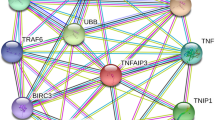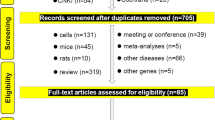Abstract
Psoriasis and psoriatic arthritis (PsA) is a complex autoimmune disease. NOD2/CARD15 gene has been suggested to play an important role in the pathogenesis of psoriasis and PsA. This study aims to assess the association between NOD2/CARD15 polymorphisms and the susceptibility to psoriasis/PsA. A meta-analysis was performed to survey studies on the NOD2/CARD15 polymorphisms and psoriasis/PsA using comprehensive PubMed, Embase, and Web of Science citation search. A total of 9 published studies were involved. Meta-odds ratios (ORs) and 95% confidence intervals (CIs) based on fixed effects models or random effects models were depended on Cochran’s Q-statistic. Potential publication bias was evaluated by Egger’s linear regression test. As for R702W, the pooled ORs were 1.041 (95% CI 0.854–1.268, P = 0.693; 2,081 patients vs. 2,717 controls) for C allele and 0.886 (95% CI 0.565–1.391. P = 0.600; 1,222 patients vs. 1,818 controls) for genotype. Then for G908R, the pooled ORs were 1.042 (95% CI, 0.761–1.426, P = 0.799; 2,053 patients vs. 2,743 controls) for C allele and 0.942 (95% CI 0.708–1.254, P = 0.683; 1,226 patients vs. 1,824 controls) for the homozygous wild type. Then for Leu1007fsinsC allele polymorphism and genotype, the pooled ORs were 1.160 (95% CI, 0.893–1.507, P = 0.266; 2,279 patients vs. 3,067 controls) and 1.266 (95% CI 0.897–1.789, P = 0.180; 1,979 patients vs. 1,607 controls), respectively. No obvious publication bias was shown in the results. The association between NOD2/CARD15 polymorphisms and psoriasis/PsA was not found. Taken together, our results suggest that NOD2/CARD15 might not be a susceptibility gene for psoriasis and psoriatic arthritis.




Similar content being viewed by others
References
Griffiths CE, Barker JN (2007) Pathogenesis and clinical features of psoriasis. Lancet 370(9583):263–271
Krueger JG, Bowcock A (2005) Psoriasis pathophysiology: current concepts of pathogenesis. Ann Rheum Dis 64(Suppl 2):ii30-6
Zhang X, Wang H, Te-Shao H, Yang S, Chen S (2002) The genetic epidemiology of psoriasis vulgaris in Chinese Han. Int J Dermatol 41(10):663–669
Gladman DD, Antoni C, Mease P, Clegg DO, Nash P (2005) Psoriatic arthritis: epidemiology, clinical features, course, and outcome. Ann Rheum Dis 64(Suppl 2):ii14-7
Kane D, Stafford L, Bresnihan B, FitzGerald O (2003) A prospective, clinical and radiological study of early psoriatic arthritis: an early synovitis clinic experience. Rheumatology (Oxford) 42(12):1460–1468
Nair RP, Henseler T, Jenisch S et al (1997) Evidence for two psoriasis susceptibility loci (HLA and 17q) and two novel candidate regions (16q and 20p) by genome-wide scan. Hum Mol Genet 6(8):1349–1356
Karason A, Gudjonsson JE, Jonsson HH et al (2005) Genetics of psoriasis in Iceland: evidence for linkage of subphenotypes to distinct Loci. J Invest Dermatol 124(6):1177–1185
Karason A, Gudjonsson JE, Upmanyu R et al (2003) A susceptibility gene for psoriatic arthritis maps to chromosome 16q: evidence for imprinting. Am J Hum Genet 72(1):125–131
Lee FI, Bellary SV, Francis C (1990) Increased occurrence of psoriasis in patients with Crohn’s disease and their relatives. Am J Gastroenterol 85(8):962–963
Li Y, Chang M, Schrodi SJ et al (2008) The 5q31 variants associated with psoriasis and Crohn’s disease are distinct. Hum Mol Genet 17(19):2978–2985
Inohara C, McDonald C, Nunez G (2005) NOD-LRR proteins: role in host-microbial interactions and inflammatory disease. Annu Rev Biochem 74:355–383
Girardin SE, Boneca IG, Viala J et al (2003) Nod2 is a general sensor of peptidoglycan through muramyl dipeptide (MDP) detection. J Biol Chem 278(11):8869–8872
Girardin SE, Tournebize R, Mavris M et al (2001) CARD4/Nod1 mediates NF-kappaB and JNK activation by invasive Shigella flexneri. EMBO Rep 2(8):736–742
Jackson JR, Seed MP, Kircher CH, Willoughby DA, Winkler JD (1997) The codependence of angiogenesis and chronic inflammation. FASEB J 11(6):457–465
Rahman P, Bartlett S, Siannis F et al (2003) CARD15: a pleiotropic autoimmune gene that confers susceptibility to psoriatic arthritis. Am J Hum Genet 73(3):677–681
Borgiani P, Vallo L, D’Apice MR et al (2002) Exclusion of CARD15/NOD2 as a candidate susceptibility gene to psoriasis in the Italian population. Eur J Dermatol 12(6):540–542
Young C, Allen MH, Cuthbert A et al (2003) A Crohn’s disease-associated insertion polymorphism (3020insC) in the NOD2 gene is not associated with psoriasis vulgaris, palmo-plantar pustular psoriasis or guttate psoriasis. Exp Dermatol 12(4):506–509
Giardina E, Novelli G, Costanzo A et al (2004) Psoriatic arthritis and CARD15 gene polymorphisms: no evidence for association in the Italian population. J Invest Dermatol 122(5):1106–1107
Plant D, Lear J, Marsland A, Worthington J, Griffiths CE (2004) CARD15/NOD2 single nucleotide polymorphisms do not confer susceptibility to type I psoriasis. Br J Dermatol 151(3):675–678
Ho P, Bruce IN, Silman A et al (2005) Evidence for common genetic control in pathways of inflammation for Crohn’s disease and psoriatic arthritis. Arthritis Rheum 52(11):3596–3602
Lascorz J, Burkhardt H, Huffmeier U et al (2005) Lack of genetic association of the three more common polymorphisms of CARD15 with psoriatic arthritis and psoriasis in a German cohort. Ann Rheum Dis 64(6):951–954
Jenisch S, Hampe J, Elder JT et al (2006) CARD15 mutations in patients with plaque-type psoriasis and psoriatic arthritis: lack of association. Arch Dermatol Res 297(9):409–411
Graell E, Arostegui JI, Sanmarti R et al (2010) Possible association between NOD2 variants and joint surgery in psoriatic arthritis. Clin Exp Rheumatol 28(1):30–34
Egger M, Davey Smith G, Schneider M, Minder C (1997) Bias in meta-analysis detected by a simple, graphical test. BMJ 315(7109):629–634
Yazdanyar S, Kamstrup PR, Tybjaerg-Hansen A, Nordestgaard BG (2010) Penetrance of NOD2/CARD15 genetic variants in the general population. CMAJ 182(7):661–665
Rosenstiel P, Huse K, Till A et al (2006) A short isoform of NOD2/CARD15, NOD2-S, is an endogenous inhibitor of NOD2/receptor-interacting protein kinase 2-induced signaling pathways. Proc Natl Acad Sci USA 103(9):3280–3285
Gaya DR, Russell RK, Nimmo ER, Satsangi J (2006) New genes in inflammatory bowel disease: lessons for complex diseases? Lancet 367(9518):1271–1284
Yang SK, Loftus EV Jr, Sandborn WJ (2001) Epidemiology of inflammatory bowel disease in Asia. Inflamm Bowel Dis 7(3):260–270
Oudot T, Lesueur F, Guedj M et al (2009) An association study of 22 candidate genes in psoriasis families reveals shared genetic factors with other autoimmune and skin disorders. J Invest Dermatol 129(11):2637–2645
Acknowledgements
This work was supported by a grant from the General Program of National Natural Science Foundation of China (81000692, 30971644). We thank for assistance from YF. Zou and Y Fan (Department of Epidemiology and Biostatistics, School of Public Health, Anhui Medical University). We received the kind help of Dr. Graell and Dr. Yazdanyar who have given us detailed explanation of their research.
This work was supported by a grant from the General Program of National Natural Science Foundation of China (81000692, 30971644).
Conflict of interest
The authors state no conflict of interest.
Author information
Authors and Affiliations
Corresponding authors
Rights and permissions
About this article
Cite this article
Zhu, K., Yin, X., Tang, X. et al. Meta-analysis of NOD2/CARD15 polymorphisms with psoriasis and psoriatic arthritis. Rheumatol Int 32, 1893–1900 (2012). https://doi.org/10.1007/s00296-011-1813-2
Received:
Accepted:
Published:
Issue Date:
DOI: https://doi.org/10.1007/s00296-011-1813-2




